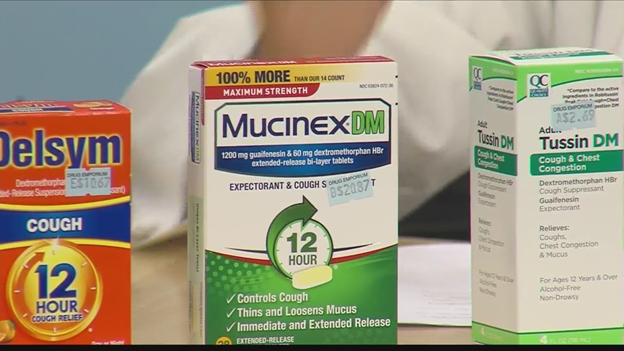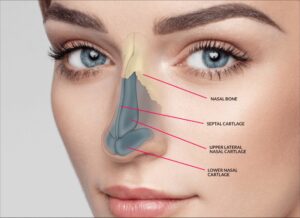
It is available without a prescription and is particularly effective against dry, persistent coughs. Mucinex also acts as both a cough suppressant and an expectorant, with a specific focus on addressing mucus and chest congestion.
It is recommended for individuals dealing with issues like post-nasal drip, sinus congestion, and other conditions involving chest congestion. Ultimately, the choice between the two hinges on personal symptoms and needs.
If there’s uncertainty regarding the best option, seeking guidance from a doctor is advisable.
Can You Take Delsym and Mucinex Together?
Yes, combining Delsym and Mucinex is possible. However, it’s important to consult a doctor or pharmacist before introducing any new medication, even those available over-the-counter. This is because certain medications might interact with each other.
Delsym, containing dextromethorphan as its active ingredient, serves as a cough suppressant. Mucinex, with guaifenesin as its active component, acts as an expectorant to aid in mucus clearance. Both can be utilized to manage cold or upper respiratory infection symptoms, but it’s crucial to adhere to professional guidance for optimal safety and effectiveness.
Can Delsym Stop Coughing?
Indeed, Delsym can effectively halt coughing. Delsym is an over-the-counter cough remedy used to address coughs stemming from common colds, bronchitis, and other respiratory ailments. Its active ingredient, dextromethorphan, serves as a cough suppressant that diminishes the urge to cough.
By hindering the cough reflex, Delsym brings about a reduction in coughing. Its effects typically begin within half an hour and persist for up to 12 hours, offering respite from coughing symptoms. It is crucial to follow the usage instructions and not exceed recommended dosages, while also paying attention to any warnings on the product label, particularly if pregnant, nursing, or consuming other medications.
What Types of Coughs Does Delsym Assist With?
Delsym, available without a prescription, is an effective cough suppressant that caters to both persistent and wet coughs. It employs an exclusive extended-release mechanism that provides cough relief for up to 12 hours. Delsym is indicated for both long-term control and symptomatic relief of wet, persistent coughs resulting from minor throat and bronchial irritations linked to allergies, colds, or dry, tickling coughs attributed to throat irritants like smoke or dust.
It effectively reduces both daytime and nighttime coughing frequency and intensity, facilitating better sleep during allergy seasons or while battling colds. Delsym functions similarly to a decongestant by diminishing coughing and aiding in mucus clearance.
Is There a Better Alternative to Mucinex for Coughs?
In the pursuit of alleviating cough symptoms, various alternatives can be considered that might surpass Mucinex’s efficacy. Over-the-counter cough medications such as Robitussin, Delsym, and Vicks Nyquil offer temporary relief by reducing chest congestion, minimizing cough frequency, or suppressing the urge to cough.
Furthermore, options like cough drops, honey, steam inhalation, or humidifiers can provide symptom relief. For more intense coughs, healthcare professionals can prescribe cough suppressants such as codeine or Hydrocodone, particularly beneficial for dry or disruptive coughs that hinder sleep.
It’s crucial to be aware that narcotics can induce drowsiness and should be discussed with a medical professional before use. For persistent coughs, doctors might suggest other medications or treatments such as antibiotics, steroids, or bronchodilators, tailored to individual needs. Alongside medication, maintaining good self-care practices by resting, staying hydrated, and avoiding irritants is vital while managing a cough.
Is Mucinex Effective in Suppressing Coughs?
Mucinex, an over-the-counter medication containing guaifenesin, is widely employed to tackle chest congestion connected to coughs and colds. Its mechanism involves thinning mucus in the airways, thereby enhancing the productivity of coughing.
While studies offer limited evidence of Mucinex’s efficacy in reducing cough frequency and severity, it’s important to note that the medication doesn’t target the cough’s root cause. If symptoms persist or worsen, consulting a doctor for comprehensive evaluation and treatment is recommended.
Moreover, Mucinex isn’t suitable for children below 12 years old, so professional advice should be sought before administering it to them.
Most Effective Medication for Suppressing Coughs
The most effective medication for suppressing coughs hinges on the underlying cause of the cough. For coughs arising from viruses or bacterial infections, over-the-counter medications containing dextromethorphan (DM) and/or guaifenesin might prove effective.
DM and guaifenesin aid in cough suppression and mucus loosening. Coughs caused by allergies can benefit from antihistamine-containing medications like loratadine (Claritin) or cetirizine (Zyrtec), or a combination of antihistamines and DM.
Doctors may also prescribe cough suppressants like codeine, hydrocodone, or dextromethorphan. These deliver potent and immediate relief but should be taken as directed due to potential side effects like drowsiness.
Conditions such as asthma or chronic obstructive pulmonary disease (COPD) can induce coughing; treatments include bronchodilators, inhaled corticosteroids, and other medications tailored to the specific condition. In all cases, consulting a doctor is essential to determine the most fitting treatment approach.
Substitute for Mucinex
Several options can substitute for Mucinex, a medication primarily containing the expectorant guaifenesin. These alternatives may also encompass expectorants or a combination of expectorants and decongestants.
Common medications with expectorants include Robitussin, Prospan, and Vicks Mucus Relief. If both expectorants and decongestants are desired, options like Bromfed, Delsym, and Mucinex D may be explored.
Natural remedies like steam inhalation, warm fluids, and warm saltwater gargles can also offer relief. However, it’s recommended to read product labels carefully and consult healthcare professionals before selecting an alternative to Mucinex.
Delsym vs. Robitussin for Cough
The choice between Delsym and Robitussin hinges on the nature of the cough and individual needs. Delsym contains dextromethorphan, acting as a cough suppressant and expectorant. It is effective against coughs linked to colds, flu, bronchitis, and respiratory infections, particularly those that are persistent.
Robitussin, also available without a prescription, contains both dextromethorphan (cough suppressant) and guaifenesin (expectorant). It is suitable for dry, non-productive coughs and throat irritation.
The preference for one over the other should be guided by professional advice and symptom assessment.
Strongest Over-The-Counter Mucinex
Mucinex Maximum Strength stands as the most potent over-the-counter version of Mucinex. Available in tablet and liquid forms, this version contains 1200 milligrams of guaifenesin, the active ingredient. This dosage is four times higher than the regular Mucinex formula, which contains 300 milligrams of guaifenesin.
Mucinex Maximum Strength is designed to address chest congestion arising from colds, flu, allergies, or respiratory issues. By thinning and loosening mucus, it facilitates its expulsion.
Does Mucinex Facilitate Coughing Up Phlegm?
Yes, Mucinex can induce coughing up of phlegm. Mucinex’s active ingredient, guaifenesin, serves as an expectorant that thins mucus in the airways, making it easier to expel. This may lead to increased coughing as the loosened mucus is cleared.
Such coughing is a positive sign, indicating that Mucinex is effectively assisting in mucus clearance. However, if excessive mucus or breathing difficulties are encountered, consulting a doctor is recommended.
Onset Time for Mucinex’s Effects
The onset of Mucinex’s effects depends on the specific formulation and the individual’s response. Mucinex contains either guaifenesin or pseudoephedrine hydrochloride.
Guaifenesin typically starts working within 30 minutes to an hour after ingestion, best taken with ample liquids. Pseudoephedrine hydrochloride’s effects become noticeable within 15 to 20 minutes and may last for 4 to 6 hours, targeting nasal and sinus congestion.
Adhering to usage instructions and seeking medical advice if necessary is crucial.
Managing and Alleviating Coughs
Addressing coughs involves holistic care and, in some cases, medical interventions. Natural remedies such as hydration, herbal remedies, steam therapy, warm beverages, and ample rest can aid in symptom relief.
Over-the-counter medications like cough suppressants and expectorants offer solutions, and a doctor’s consultation may lead to stronger prescription options, especially for specific underlying conditions like asthma or COPD.
Maintaining good self-care practices alongside appropriate treatments is vital for managing cough symptoms effectively.



